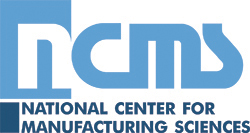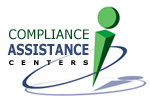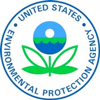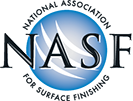| Presented in Partnership with: | |||
 |
 |
 |
 |
Date: December 4, 1995
To: Dave Wagoner, Aware Environmental Inc.
Fr: Mark Ingle, US EPA, Engineering and Analysis Division
Re: Metal Finishing (40 CFR 433) and Electroplating (40 CFR 413) Categorical Standard Applicability
Discussion
On November 28, 1995, you called me to discuss applicability of the subject effluent limitations guidelines to operations a metallographic laboratory that performs bench-scale etching of metallographic samples. You wanted to know whether or not such operations would be cover under the subject guidelines as an "Etching" process.
Based on a review of the 40 CFR 413 and 40 CFR 433 development documents, and a review of precedents by EPA staff familiar with permit requirements, the following are key applicability criteria for the subject effluent limitations guidelines:
1. The development documents for the subject effluent limitation guidelines discuss industrial operations intended to either remove bulk metal (i.e., chemical milling) or to produce a specific surface appearance on products. The key issue in each of these discussions is that the operations are performed on products and not on the test-specimen etching that would be conducted in a metallurgical laboratory. Consequently, the subject guidelines would not be technically applicable to metallurgical laboratories.
2. The location and operations of a metallurgical laboratory would affect the categorical determination. Because 40 CFR 433 does include "Testing" as one of the 40 regulated processes, effluent from a metallurgical testing laboratory, located at an otherwise covered facility, would be included in process wastewater flow totals. However, because "Testing" is not one of the six "trigger" processes that a site must have to be covered by 40 CFR 433, operations at a "stand-alone" metallurgical laboratory would not be covered by the subject guidelines.
3. The fact that metallographic operations are not inherently covered by 40 CFR 413 or 40 CFR 433 does not preclude a permit writer from applying restrictions on the effluent from metallographic operations in accordance with best professional judgement.
I hope you find this information useful. If you have any other questions, or need additional information, please feel free to call me at (202) 260-7191.
 |
 |
 |
 |
 |
| Home | Subscribe | Regulations | Compliance Assistance | News | Resources | Resource Locators | Directories | Online Training | About | Search | NASF.org |
The information contained in this site is provided for your review and convenience. It is not intended to provide legal advice with respect to any federal, state, or local regulation.
You should consult with legal counsel and appropriate authorities before interpreting any regulations or undertaking any specific course of action.
Please note that many of the regulatory discussions on STERC refer to federal regulations. In many cases, states or local governments have promulgated relevant rules and standards
that are different and/or more stringent than the federal regulations. Therefore, to assure full compliance, you should investigate and comply with all applicable federal, state and local regulations.